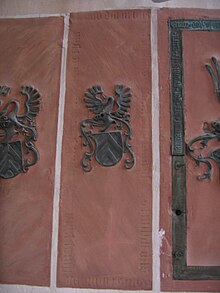Reinhard II, Count of Hanau
| Reinhard II, Count of Hanau | |
|---|---|

Reihard's grave stone in the St. Mary's Church in Hanau
|
|
| Spouse(s) | Catherine of Nassau-Beilstein |
| Noble family | House of Hanau |
| Father | Ulrich IV, Lord of Hanau |
| Mother | Elizabeth of Wertheim |
| Born | c. 1369 |
| Died | 26 June 1451 Hanau |
Reinhard II of Hanau (c. 1369 – 26 June 1451 in Hanau) was Lord of Hanau and from 1429 Count of Hanau. He was one of the most important member of the House of Hanau.
The exact date of his birth is not known, not even the exact year, because in the Middle Ages a person's death date was considered far more important than their birth date, since a memorial mass would be celebrated on the death date.
He was the second son of Ulrich IV of Hanau (born: between 1330 and 1340; died: in September or October 1380) and Countess Elizabeth of Wertheim (1347–1378 ). In the ruling family of Hanau, an explicit primogeniture statue of 1375 stipulated that only the eldest son could inherit the Lordship and even that only he could marry. Reinhard II as second son of Ulrich IV as was destined for a clerical career. He received a suitable education for such a career; in 1387 he was studying at the University of Bologna. In 1390, one of the sons of Ulrich IV, possibly Reinhard II, was enrolled as a student at the university of Heidelberg. The entry in the register does not mention a name, it merely states de Hanaw domicellus. Reinhard abandoned his spiritual career in 1391, and closed a contract with his elder brother Ulrich V, which guaranteed him an annual income. The background was probably that Ulrich V's marriage was still childless and they wanted to preserve the possibility that Reinhard might succeed Ulrich V. The contract awarded Reinhard an annual sum of 400 florins and a share in the districts Partenstein, Rieneck, Bieber and Haßlau. This was the first generation in the history of the Hanau family where the younger sons did not join the clergy. In 1398, the contract was renewed, and Ulrich and Reinhard's younger brother John of Hanau was also awarded a persion, after a dispute with John had led to actual fighting.
The heir apparent of Ulrich IV was Reinhard II's elder brother Ulrich V. Ulrich formally ruled Hanau from his father's death in 1380. However, as he was a minor at the time, a regency was set up, until he came of age in 1388. At that time, he was still without a male heir. Under the primogeniture statute, only the eldest son was allowed to marry; consequently, the continued existence of the dynasty was under threat. In 1391, a family contract was concluded, which allowed Reinhard II to marry if Ulrich still had no sons 10 years later. This 10-year period was due to end in 1401. Around 1395, a coalition between Reinhard and his younger brother John emerged. They acted independently from Ulrich and pursued policies directed against him. An open dispute arose, which was resolved by the settlement of 1398. Nevertheless, further disputes occurred, and even a feud.
...
Wikipedia
